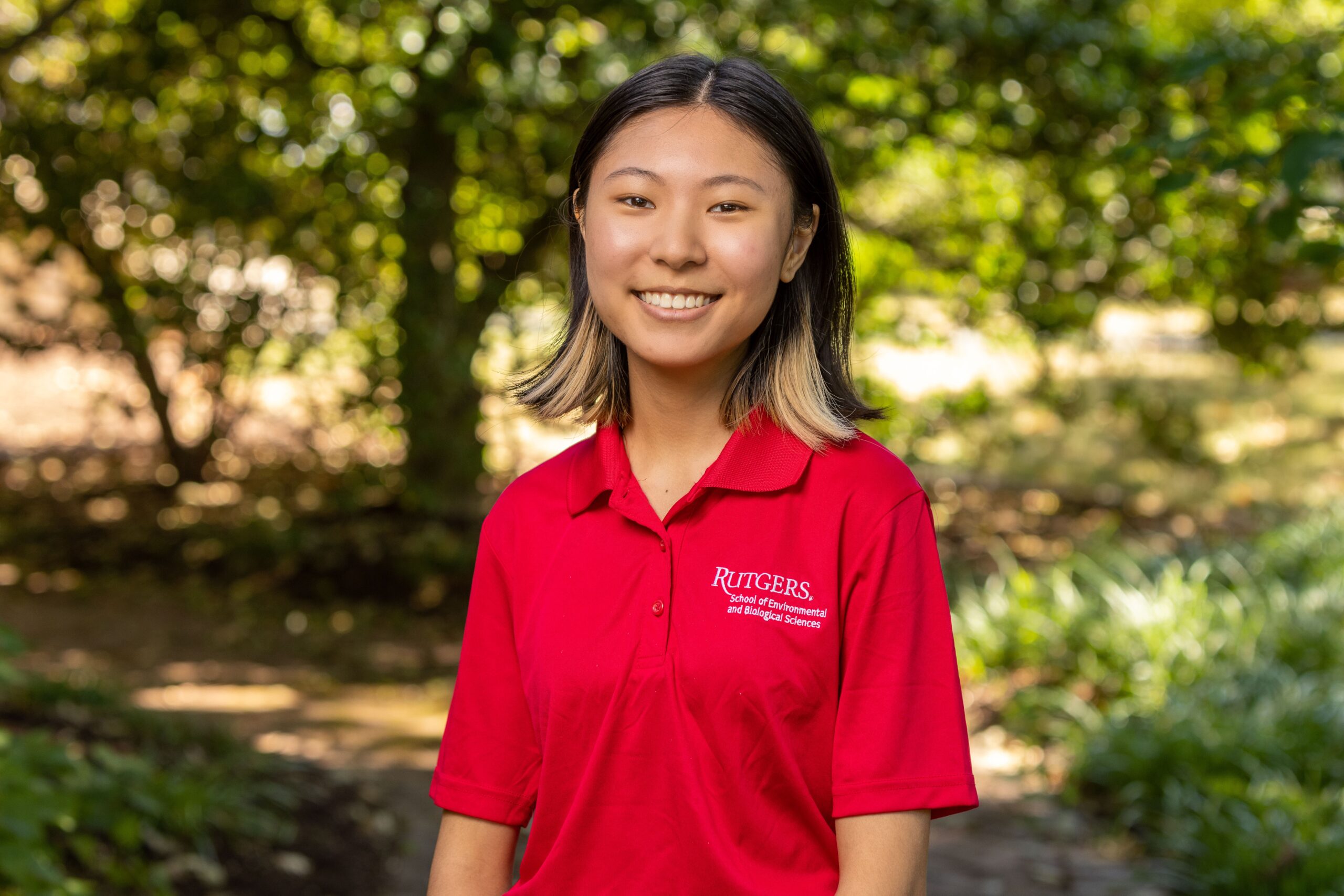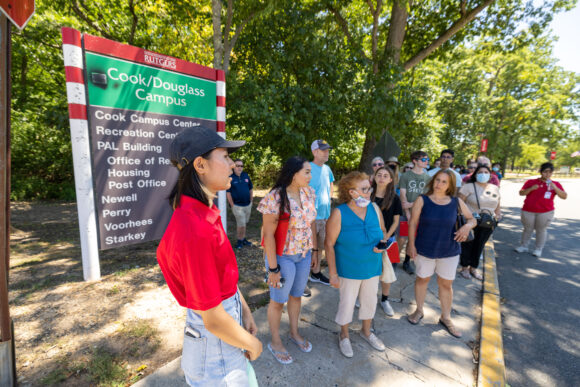
Lucy Yang, SEBS’23.
Ecology major Lucy Yang (SEBS’23) is a bright, motivated Honor’s College scholar whose academic performance has placed her on the Dean’s List each semester at Rutgers. More than subject matter knowledge, though, Lucy believes that one of the best lessons she’s learned is the value of interdisciplinary collaboration.
“My most significant life lesson that I learned at SEBS is how to collaborate with others. Through studying ecology, I learned that there are lots of moving parts to any field of study, and knowing how to effectively work with others and get along with others is crucial. It makes the work of everyone involved more impactful.”
This important skill has been reinforced through her immersive, hands-on research experiences at the School of Environmental and Biological Sciences. She joined Prof. Gal Hochman’s lab studying aquaculture the summer before her junior year and since then, she’s worked with other undergraduate students from animal science, marine sciences, biomedical engineering, pre-vet, and pre-med and experts from NOAA, Rutgers New Jersey Agricultural Experiment Station and the Haskin Shellfish Lab.
“Over time, I learned how to mesh well working with others, applying my knowledge in ecology as the only ecology student on the team, and learning from students and experts outside of my field.”
On the verge of graduating from SEBS and armed with an ecology degree and a certificate in environmental geomatics, Lucy looks back at her journey at Rutgers.
What made you choose Rutgers, and SEBS, in particular?
I chose Rutgers because I wanted to go outside of my comfort zone. Growing up in NYC, I really loved how open and relaxing the Cook/Douglass campus was and how different it was from where I grew up. I also heard about how SEBS offers a lot of hands-on experience for all of their majors, so I knew I would grow personally and professionally here.
What led you to choose ecology as your major?
The summer before my junior year of high school, I went on a trip to Peru with my Spanish class and during the trip, we spent three days in the Amazon Rainforest surrounded by wildlife. I learned about the work that local researchers were doing to conserve the rainforest and its ecosystems, and I fell in love with wildlife biology and conservation science.
The next summer, I volunteered at the Bronx Zoo as a conservation science educator to learn more about working with both animals and researchers. Going into college, I knew I wanted to work in an environmental field involving animals, but I needed to explore my interests before I settled on something I really loved.
When I first came to Rutgers, my focus was Animal Science on the Pre-Vet track. But while taking Intro to Animal Science in my first semester, I realized that I enjoyed learning more about the science side of the major than the medical side. At the same time, I was taking General Biology and our last unit was on ecology, where we learned about taxonomy, evolution and ecosystem ecology. I realized that I was more passionate about working on a broader scale in conservation than case-by-case veterinary medicine.
What do you find most interesting about your major?
What fascinates me most about Ecology, Evolution, and Natural Resources is how many fields it touches and works with. On the surface, ecology is the study of ecosystems and the interactions between the organisms and their environment, but in between the lines, ecologists have to be effective communicators and know how to work with policymakers and experts in other fields. For the same reasons, I decided to supplement my major in ecology with courses in agriculture, plant science, and marine sciences and research in resource economics and aquaculture. Especially at Rutgers, I’ve had the privilege of exploring different fields and picking up skills from each to become a more well-rounded ecologist.
You’ve been involved in several campus activities, including being a Student Ambassador. What does that entail?

SEBS Ambassador Lucy Yang conducts an Academic Programs Summer Tour.
As a Student Ambassador, I lead weekly tours around the Cook campus for prospective students and their families. I talk about academic and campus life here at Rutgers, answer any questions attendees have and share on how SEBS has helped me grow. I also help represent the Department of Ecology, Evolution, and Natural Resources on tours, panels, and at open house events. Getting to work with the other ambassadors, Deans, and faculty has been really rewarding. Most recently at the Admitted Students Day, I reconnected with a future SEBS student who I led a tour for last semester and who was accepted into the SEBS Honors Program for ecology. I also currently work with a fellow student ambassador, Matt Roffinella. When I worked my first tour of this semester with Matt, he told me that he attended my tour last summer before he came to Rutgers. Seeing how my work really left a lasting impression on people like Matt is the most rewarding part of being a SEBS Student Ambassador.
What do you envision as a career?
I hope to work as a conservation biologist, conserving and restoring ecosystems impacted by climate change. I am currently applying for jobs in natural resource management and environmental consulting. I am specifically looking at positions in aquatic ecology and urban ecology, but I am very open to exploring different niches within ecology.
How has SEBS prepared you for this next step?
SEBS has helped me grow immensely both personally and professionally. I will treasure the connections I’ve formed with peers and professors here. I was able to discover the field that I am most passionate about and also learn from other fields like agriculture and marine sciences. I’ve learned how to collaborate with others and draw from the expertise of people within and beyond the field of ecology. Most of all, I am confident in my knowledge and skills, and I can’t wait to apply them to the opportunities the future holds for me.

